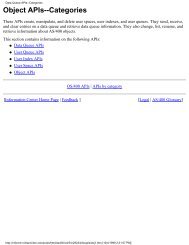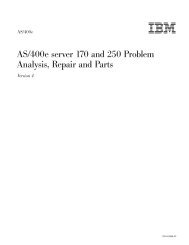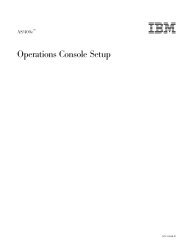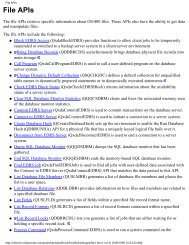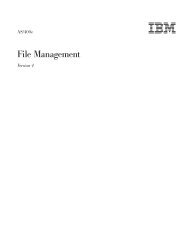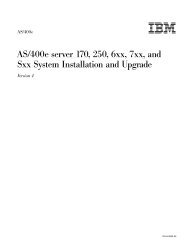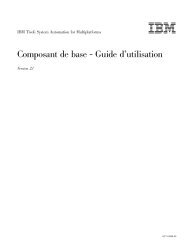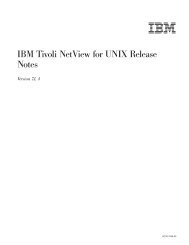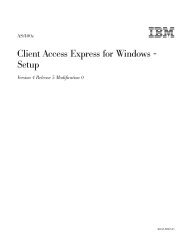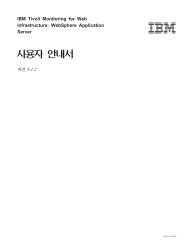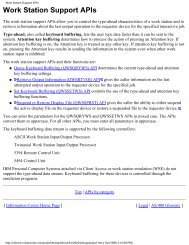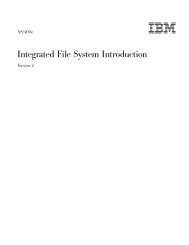Qshell Interpreter (qsh) - FTP Directory Listing - IBM
Qshell Interpreter (qsh) - FTP Directory Listing - IBM
Qshell Interpreter (qsh) - FTP Directory Listing - IBM
Create successful ePaper yourself
Turn your PDF publications into a flip-book with our unique Google optimized e-Paper software.
Client program<br />
{<br />
va_list ap;<br />
/* Build the formatted string. */<br />
va_start(ap, format);<br />
vsprintf(log_buffer, format, ap);<br />
va_end(ap);<br />
/* Write the formatted string. */<br />
write(fd, log_buffer, strlen(log_buffer));<br />
return;<br />
} /* End of SendError() */<br />
/*<br />
* Handler to clean up when the program is canceled.<br />
*/<br />
void CleanupHandler(_CNL_Hndlr_Parms_T *cancel_info)<br />
{<br />
int sfd;<br />
sfd = *((int *)cancel_info->Com_Area);<br />
close(sfd);<br />
} /* End of CleanupHandler() */<br />
[ Legal | AS/400 Glossary ]<br />
Disclaimer<br />
<strong>IBM</strong> grants you a nonexclusive license to use this as an example from which you can<br />
generate similar function tailored to your own specific needs.<br />
This sample code is provided by <strong>IBM</strong> for illustrative purposes only. These examples have not<br />
been thoroughly tested under all conditions. <strong>IBM</strong>, therefore, cannot guarantee or imply<br />
reliability, serviceability, or function of these programs.<br />
All programs contained herein are provided to you “AS IS” without any warranties of any<br />
kind. The implied warranties of merchantability and fitness for a particular purpose are<br />
expressly disclaimed.<br />
/**********************************************************************/<br />
/* */<br />
/* Name: <strong>qsh</strong>c.c */<br />
/* */<br />
/* Description: This program is a client for an interactive <strong>qsh</strong> */<br />
/* session running on a remote AS/400. The program */<br />
/* first connects to a server on the specified */<br />
/* AS/400 and sends the user name and password of */<br />
/* the client. After the <strong>qsh</strong> session is started, */<br />
/* the program takes input from stdin and sends it */<br />
/* to the server and receives output from the server */<br />
/* and displays it on stdout. */<br />
/* */<br />
/* Parameters: 1. Host running the <strong>qsh</strong> server (either host name or */<br />
/* IP address). */<br />
/* */<br />
/* Options: 1. -n to force prompt for user name and password. */<br />
/* 2. -p to specify port of <strong>qsh</strong> server. */<br />
/* */<br />
/* Notes: 1. The user name and password are sent as plain text */<br />
/* to the server. */<br />
/* 2. All translations from ASCII to EBCDIC are done by */<br />
/* this program on the client. */<br />
/* 3. The program includes translation tables for */<br />
/* converting between EBCDIC code page 37 (US English)*/<br />
/* and ASCII code page 850 (US English). You can */<br />
/* modify these tables to support other code pages. */<br />
/* Or if your system supports the iconv APIs, you */<br />
/* can define USE_ICONV to translate using iconv(). */<br />
Chapter 6. Remote client examples 125



